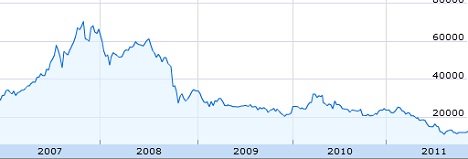November 30, 2011 | In: General
Difference Between a Stock Broker and a Stock Trader
While explaining the wonderful world of stock trading to one of my friends, he asked me the following question, what is the difference between a stock broker and a stock trader. My answer was “Just Google it!”. And he did, and then he came back to me, and told me that he read the answer to his question on several websites, and each website had a different answer for him.
I checked, and to my surprise, he was right, and what was even more surprising was that not a single website was accurate in differentiating between the two.
One website stated that both stock traders and stock brokers need to be licensed by FINRA (Financial Industry Regulatory Authority) which is wrong. A stock trader doesn’t have to be licensed at all, only the stock broker has to be licensed.
Another website stated that a stock broker is always envious of a stock trader, and it would be an insult to call a stock trader a stock broker (the former will be insulted, apparently) – again – this is wrong. The same website also stated that a stock broker cannot be a trader, but the reverse can be true (so a trader can be a stock broker at the same time), which doesn’t make any sense.
It’s amazing the amount of filth and misleading information you can find on the Internet these days. I wish that Google develops an algorithm that is able to distinguish between right content and wrong content.
In any case, here is a list of all the differences between the two:
- A stock broker is someone whose job is to recommend and trade stocks on behalf of other people, a stock trader is someone who trades stocks for himself (anyone buying and selling equities/options with his own money is a stock trader).
-
A stock broker does not take any personal risks when trading stocks1 (he’s trading with other people’s money, and if he loses some of their money, then it’s too bad for them), a stock trader carries personal risk when trading stocks, because he’s trading with his own money.
-
A stock broker needs to have an educational background in finance or similar majors (for example, a university degree in finance), a stock trader doesn’t need an educational background at all.
-
A stock broker has to be licensed by the respective authority in his country, a stock trader doesn’t need to be licensed.
-
A stock broker works at an investment firm, a stock trader can work anywhere (he can even be unemployed).
-
A stock broker can trade stocks for himself, which makes him a stock trader. A stock trader, on the other hand, cannot become a stock broker unless he satisfies the educational and the licensing requirements.
I hope my post above clarified the real differences between a stock broker and a stock trader.
1Note that it’s possible for the stock broker to be sued by his clients if he loses a lot of their money.
This article (as well as all other articles on this website) is an intellectual property and copyright of Fadi El-Eter and can only appear on fadi.el-eter.com.
